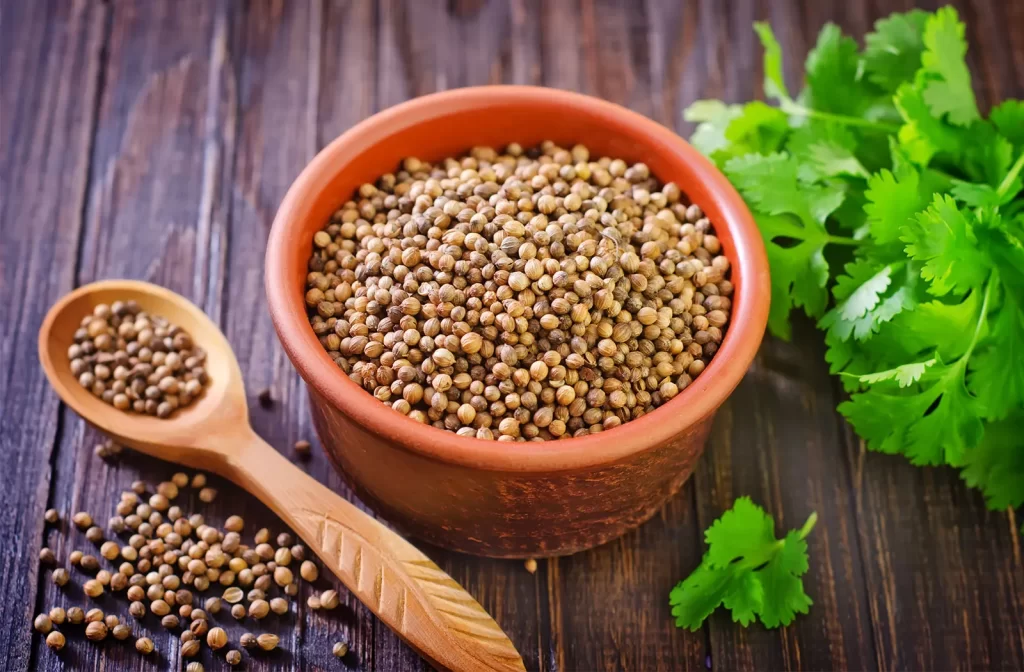Coriandrum Sativum
Coriander Botanical Name -
Coriander, scientifically known as Coriandrum Sativum, is a herb that has been cherished for centuries due to its culinary and medicinal properties. Its delicate aroma and distinctive flavor profile have made it a staple in cuisines worldwide. However, few may realize that this unassuming herb boasts numerous health benefits and medicinal applications. This comprehensive guide will delve into the incredible advantages of coriander, explore its potential uses in medicine, discuss any potential side effects, and offer insights on its suitability for individuals with kidney issues. Coriander Botanical Name.

Coriandrum Sativum Benefits-
Rich in Nutrients: Coriander stands as a nutritional powerhouse, boasting an abundance of vital nutrients. Its impressive profile includes vitamins A, C, and K, along with minerals like potassium, calcium, and magnesium. These essential components work together intricately to enhance overall health and promote holistic well-being.
Digestive Aid: Coriander boasts natural digestive properties, making it an excellent aid for alleviating indigestion, bloating, and discomfort. Additionally, it can support healthy bowel movements.
Antioxidant Action: Coriander contains antioxidants like beta-carotene and quercetin, which work against harmful free radicals in the body. This can potentially lower the risk of chronic diseases and promote cellular health.
Cholesterol Management: According to several studies, incorporating coriander into your diet may potentially aid in reducing LDL (bad) cholesterol levels. This beneficial effect on cholesterol can contribute to overall heart health improvement
Anti- Inflammatory Effects: Coriander possesses compounds that exhibit anti-inflammatory properties. These compounds have the potential to aid in the management of conditions associated with inflammation, such as arthritis.
Blood Sugar Regulation: Preliminary research suggests that coriander may have potential in maintaining stable blood sugar levels, providing hope for individuals dealing with diabetes or those at risk. This finding is particularly promising as it could contribute to better management of blood sugar regulation.
Skin Health: With its antimicrobial properties, the herb proves invaluable for skincare routines. It can effectively combat acne-causing bacteria and contribute to a clearer complexion. Coriandrum Sativum Benefits. Coriander Scientific Name. Darumukti

What are the Medicinal Uses of Coriander-
Traditional Medicine: In traditional systems like Ayurveda, coriander has been used to address digestive issues, boost appetite, and alleviate menstrual discomfort.
Skin Health: With its antimicrobial properties, the herb proves invaluable for skincare routines. It can effectively combat acne-causing bacteria and contribute to a clearer complexion.
Diuretic Properties : Coriander possesses diuretic properties, which can stimulate the production of urine and potentially aid in eliminating toxins from the body.
Antimicrobial Action: According to some sources, coriander’s natural compounds are believed to possess anti-anxiety potential as they may have a calming effect on the nervous system. This potential effect of coriander could potentially assist in reducing anxiety levels.
Antispasmodic: Coriander’s essential oils possess antimicrobial properties, making them effective in combating bacterial and fungal infections. This attribute holds promise for managing such infections successfully.
Oral Health : The herb’s antimicrobial and anti-inflammatory properties potentially enhance oral hygiene and lower the risk of gum diseases. Oral health may benefit from these attributes. What are the Medicinal Uses of Coriander.Darumukti
Coriandrum Sativum Side Effects-
Allergic Reactions: While relatively uncommon, some individuals might develop allergic reactions to coriander. These herb-induced reactions may appear as skin rashes, itching, or hives upon direct contact. In more severe scenarios, allergies can result in breathing difficulties or swelling of the face, lips, or throat. If you suspect an allergic reaction, it is crucial to discontinue use immediately and seek medical attention.
Skin Sensitivity: In some individuals, handling coriander leaves or seeds directly can cause skin sensitivity. This may lead to symptoms such as redness, irritation, or a burning sensation on the skin. Wearing gloves while handling coriander or avoiding direct contact can help prevent this issue.
Medication Interactions: Coriander contains compounds that have the potential to interact with certain medications, especially those that thin the blood. If you are currently taking blood-thinning medications, it is advisable to consult your healthcare provider before consuming large quantities of coriander or using it as a supplement. This interaction could potentially affect the effectiveness of your medications or result in unwanted side effects. Darumukti
Gastrointestinal Distress: Excessive consumption of coriander can sometimes lead to gastrointestinal discomfort. Symptoms such as stomach cramps, bloating, gas, or diarrhea may occur in these cases. This is more likely when coriander is consumed in large amounts or if one has a sensitive stomach.. Moderation is key to avoiding such digestive issues.
Cross-Reactivity: For individuals with pollen allergies, especially those allergic to mugwort, ragweed, or similar plants, there’s a possibility of experiencing cross-reactivity with coriander. This means that the immune system might recognize similar proteins in both pollen and coriander, triggering allergic symptoms. If you have known pollen allergies, be cautious when introducing coriander into your diet. Coriandrum Sativum Side Effects.
Is Coriander good for Kidney Patients-
Coriander, in moderation, can be a valuable addition to the diet of kidney patients due to its potential benefits:
Potassium Control: Coriander contains less potassium compared to some other herbs, making it suitable for individuals needing to manage their potassium intake.
Digestive Support: Kidney patients often face digestive issues. Coriander’s digestive properties can aid in alleviating discomfort.
Antioxidant Boost: The antioxidants in coriander might contribute to overall health and counteract oxidative stress, which is beneficial for kidney function.
Flavor Enhancement: Kidney patients often have dietary restrictions. Coriander can add flavor to dishes without significantly impacting nutrient balance.
Diuretic Action: Coriander’s mild diuretic effect might aid in promoting urine production and supporting kidney function. Is Coriander good for kidney Patients. Navchetana

Conclusion-
In conclusion, coriander (Coriandrum Sativum) is a versatile herb that offers an array of health benefits and potential medicinal uses. Its rich nutrient profile, digestive aid properties, antioxidant action, and more make it a valuable addition to various aspects of wellness. However, as with any substance, moderation is key, and individuals with allergies, skin sensitivities, or those on specific medications should exercise caution. For kidney patients, coriander can be a flavorful and health-supportive choice when included mindfully in their diet. Always consult a healthcare professional before making significant dietary changes or introducing new herbs or supplements.IS Coriander good for Kidney patients.
By incorporating this delightful herb into your lifestyle sensibly, you can embark on a journey towards improved well-being, savoring both the culinary and health-enhancing aspects of coriander.
BUY DE-ADDICTION PRODUCT Click on: Darumukti

